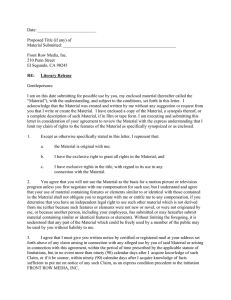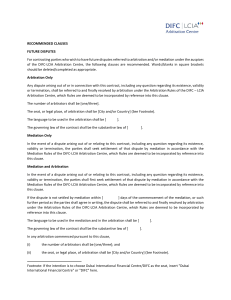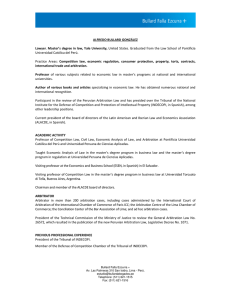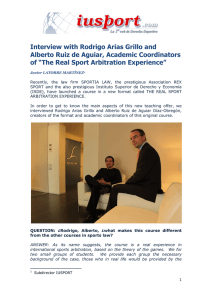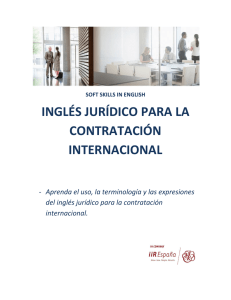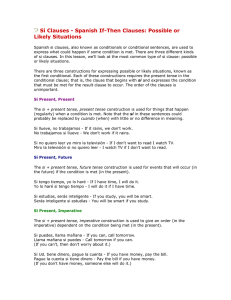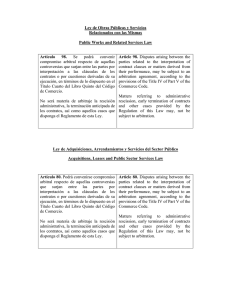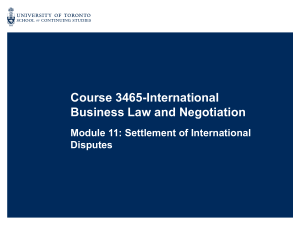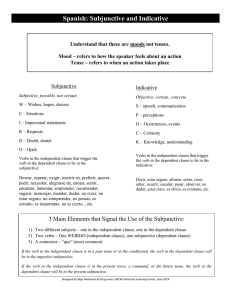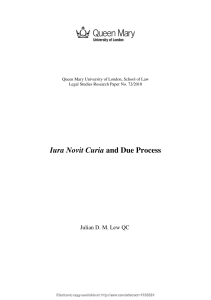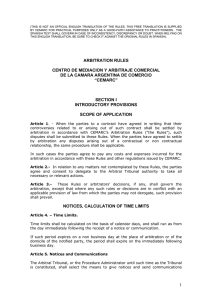Jurisdiction, arbitration and choice of law in TT and RTD contracts
Anuncio
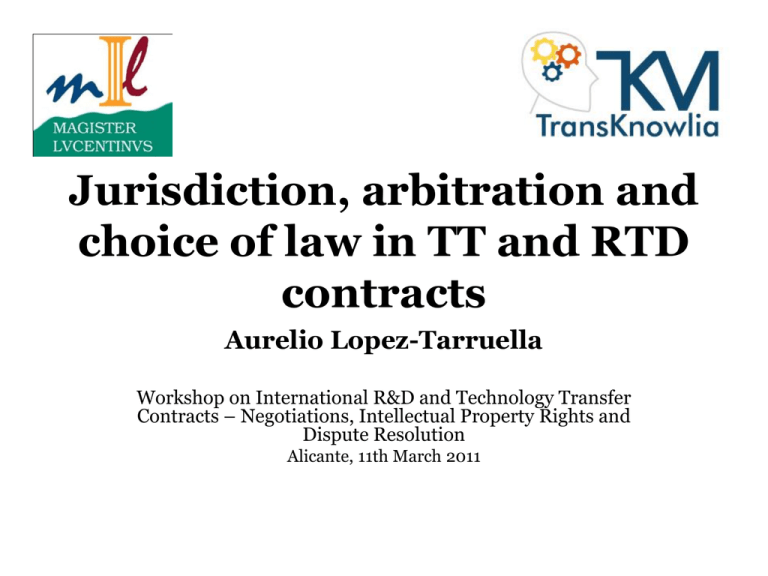
Jurisdiction, arbitration and choice of law in TT and RTD contracts Aurelio Lopez-Tarruella Workshop on International R&D and Technology Transfer Contracts – Negotiations, Intellectual Property Rights and Dispute Resolution Alicante, 11th March 2011 Introduction • By definition Technology Transfer Agreements (TT) and Research and Development Contracts (RTD) are complex… • …but even more when the contract is international: – where can I sue, where can I be sued? – which law(s) will apply to the different aspects of the contract? • Parties can make use of: – Forum-choice clauses – Arbitration/Mediation Agreements – Choice of law clauses • Whether the parties choose one clause or the other depends on the particular situation of each contract http://www.transknowlia.org 2 The parties do not include any of these clauses • …and do not reach an agreement when the dispute arises • Where can I sue, where can I be sued?: – Defendant’s domicile (art. 2 R. 44/2001); or – The place of performance of the obligation in question (art. 5.1); or – in cases of IP infringement, before the courts of the place where the infringement took place (Art. 5.3); or – in case several defendant exists, before the courts of the Member State of domicile of one of them (Art. 6.1). – if the dispute concerns questions of validity or registration of an IP right (Art. 22.4): exclusive jurisdiction of the courts of the Member State of registration • If the defendant is domiciled in a third State, the situation is even worse http://www.transknowlia.org 3 The parties do not include any of these clauses • • • • Lack of legal predictability for the parties Danger of forum shopping Danger of parallel litigation in multiple states In several cases, lack of expertise of national judges in this field • Judicial proceedings are complex and slow • What is the law applicable to the dispute?: – Contractual aspects: R. 593/08 (Rome I) – IP infringement:Art. 8 R. 864/07 (Rome II) – Other IP Aspects (joint ownership): lex protectionis • Proof of foreign law in some countries is extremely burdersome http://www.transknowlia.org 4 The parties includes a forumchoice and a choice of law clause • • Legal predictability is increased No possibility of forum shopping No possibility of parallel proceedings … … as far as the scope of the clause is clearly stated: “The English Courts will have exclusive jurisdiction to deal with any dispute which has arisen or may arise out of or in connection with this Agreement […]” (Lambert Consortium Agreement) “All disputes or differences directly arising in connection with this CA, (other than disputes relating to the infringement and/or validity of IPR) … which cannot be settled amicably, shall be subject to the jurisdiction of the competent court in Brussels” (EICTA Integrated Projects Consortium Agreement (IPCA) http://www.transknowlia.org 5 The parties includes a forumchoice and a choice of law clause Requirements for the validity of the clause (Art. 23 R. Brussels I): – – – – in writing (or electronic format), according to a practice established between the parties, or in a form that is widely known in the particular trade or commerce concerned; at least one of the parties must be domiciled in a Member State (if not, the validity of the clause is determined by each Member State laws); forum-choice clauses are not valid for actions on validity or registration of an IP; the fact that the forum-choice clause was imposed to the weaker party in a standard-form contract is not an argument against the enforceability of the clause. http://www.transknowlia.org 6 The parties includes a forumchoice and a choice of law clause • Forum-choice clauses allows the parties to choose IP-specialized courts…but not always • They do not ensure “neutrality” of the courts • Judicial proceedings are complex and slow • Choice of law clauses increases legal certainty, – but only to the contractual aspects (art. 3 R. Roma I), not to infringements and other IP aspects. – clauses such as this one should be avoided: “Nothing in this CA shall be deemed to require a Party to breach any mandatory statutory law under which the Party is operating” (DESCA) • Proof of foreign law might still be needed http://www.transknowlia.org 7 The parties to the contract include an arbitration clause • • • • • Parties avoid litigation: mediation Legal predictability is increased No possibility of forum shopping No possibility of parallel proceedings … ..as far as the arbitration agreement is adequately drafted: “All disputes arising out of or in connection with this contract, which cannot be solved amicably, shall be finally settled under the Rules of Arbitration of the International Chamber of Commerce by one or more arbitrators appointed in accordance with the said Rules ” (ICC recommended clause) http://www.transknowlia.org 8 The parties to the contract include an arbitration clause "Any dispute, controversy or claim arising under, out of or relating to this contract and any subsequent amendments of this contract, including, without limitation, its formation, validity, binding effect, interpretation, performance, breach or termination, as well as non-contractual claims, shall be referred to and finally determined by arbitration in accordance with the WIPO Arbitration Rules. The arbitral tribunal shall consist of [three arbitrators][a sole arbitrator]. The place of arbitration shall be [specify place]. The language to be used in the arbitral proceedings shall be [specify language]. The dispute, controversy or claim shall be decided in accordance with the law of [specify jurisdiction]." (WIPO recommended clause) http://www.transknowlia.org 9 The parties to the contract include an arbitration clause • In arbitration, everything is dependant on party automony: – – – – Submission to arbitration Choice of the arbitrators (this ensures expertise and neutrality) Choice of the procedure (flexibility and speed) Confidentiality of the award • They parties also decide how the arbitrators must solve the dispute: – ex aequo et bono, – choice of law by the parties, – proof of foreign law is not needed, • But mandatory rules and lex protectionis must be respected. http://www.transknowlia.org 10 The parties to the contract include an arbitration clause • The arbitration agreement must be in writing (Art. II NY Convention) • Arbitrability of the subject matter: – IPR disputes are arbitrable in general (Art. 2.1 L. 60/2003), except for validity issues (in certain countries) and moral rights. • Can public research entities submit to arbitration? – In Spain, public universities are Public Administration in the sense of Ley 30/2007 de contratos públicos… – … but TT and RTD contracts are excluded from the scope of the law (Art. 4.1 m) and q). – Art. 55 Ley 2/2011 (LES) and Art. 35 Proyecto Ley de la ciencia state these contracts are governed by private law – Art. 55 LES in fine states that where doubts exist, Ley 33/2003 del patrimonio de las administraciones públicas applies. Art. 31 of this law excludes arbitration. – Art. 2.2 L 60/2003 states that a public entity cannot rely on its public status to refuse compliance of an international arbitration agreement. http://www.transknowlia.org 11 The parties to the contract include an arbitration clause • Judicial cooperation on arbitration proceedings: – provisional measures, – taking of evidences – enforcement of arbitral awards • Judicial control of arbitral awards: – Awards can be appealed before judicial courts (in Spain: Audiencia provincial) – Foreign awards must be recognized before they are enforced (New York Convention has 145 signatory states). http://www.transknowlia.org 12 Thanks! Aurelio.lopez@ua.es Magister Lvcentinvs TransKnowlia LVCENTINVS http://www.transknowlia.org 13
